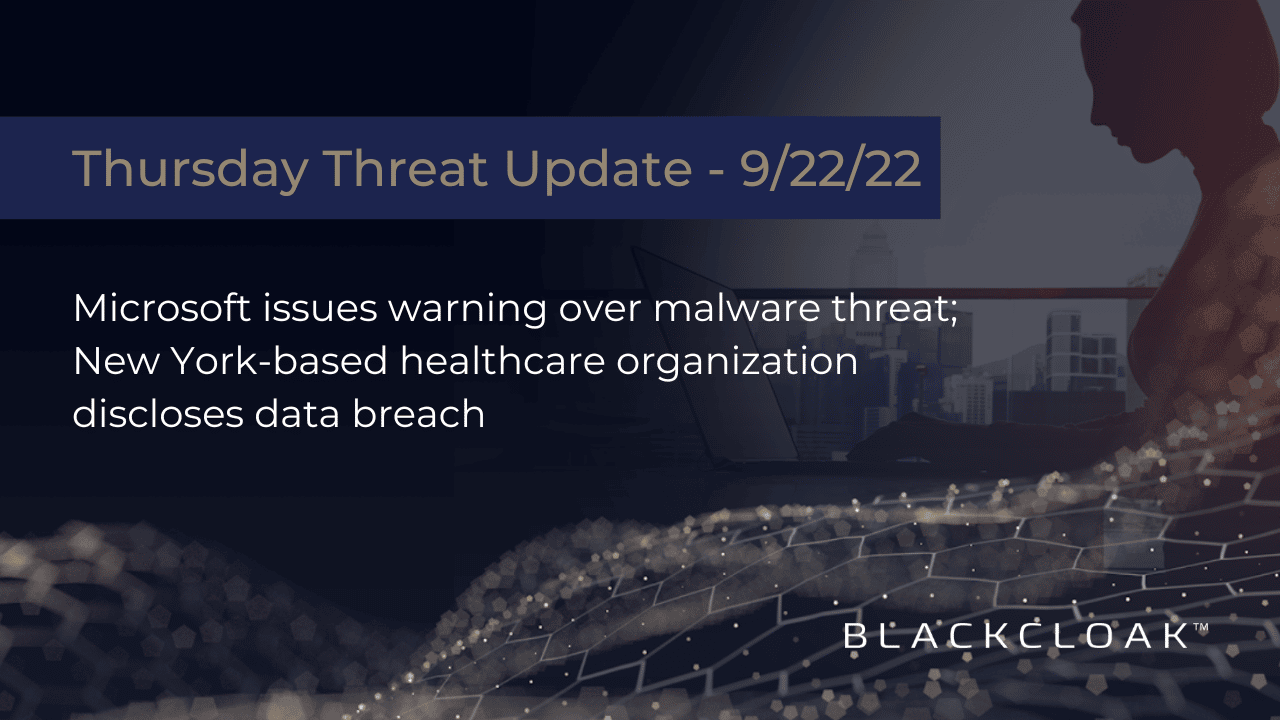Microsoft issues warning over malware threat; New York-based healthcare organization discloses data breach

Data breaches aren’t the only way cybercriminals compromise personal information. Malware is another tactic they commonly use as well. In fact, the AV-TEST Institute finds more than 450,000 new pieces of malware and other potentially unwanted applications each day.
Cybercriminals will try to disguise their malicious software. They hope that their potential victims will download it onto their devices, where they can access sensitive data or move laterally into networks.
In this week’s BlackCloak Thursday Threat Update, we highlight a recent malware attack that has caught the eye of Microsoft. We also take a look at a healthcare data breach affecting a New York-based organization.
Microsoft issues warning over ChromeLoader malware
What we know: Security researchers at Microsoft have issued warnings over a malware attack they say has evolved over recent months. The malware tool in question, known as ChromeLoader, was discovered earlier this year. It was identified in malicious browser extensions targeting login credentials. However, researchers have also discovered ChromeLoader hidden in malicious ads, links embedded in YouTube comments, and phony services designed to impersonate legitimate software. The malware has also been used to deploy ransomware and steal sensitive personal information.
Recommendations: First, never click on any links or ads that you do not explicitly recognize. If you see a link in a comment on YouTube or any other platform, you should always treat them as suspicious. Also, be sure to download any software from official sources only. Take the additional steps to search for the official website of the product to know that it’s coming from the right place. On an app store, read the description of the product as well. Be on the lookout for misspellings and poor grammar, as those are signs the application in question is not legitimate.
Empress Emergency Medical Services reports breach affecting 318K
What we know: New York-based Empress Emergency Medical Services reported a data breach affecting more than 318,000 patients. In a notice on its website, Empress EMS said the breach took place in July, and exposed data points included patients’ names, insurance information and some Social Security numbers.
Recommendations: In the data breach notice, Empress EMS said it will offer anyone affected by the breach credit monitoring services, and recommends patients monitor their healthcare statements for any potential inaccuracies. If you believe you may be a victim of the data breach, but do not receive a data breach notification letter by Oct. 9, 2022, Empress EMS recommends calling its dedicated external call center at 844-690-1251. You should also consider placing a credit freeze or fraud alert on your accounts as well.
To avoid losing time and money, don’t be caught off guard
Recent cyberattacks have shown personal digital lives can be a threat to enterprise security, and if an incident is severe enough, it could cost you, and your organization, both time and money. Learn five ways you can protect yourself from being hacked, as well as how ransomware attacks work and how you can prevent yourself from becoming a victim.









